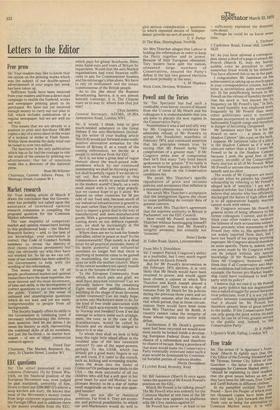EEC questions
Sir: The Letter puousned in your columns (February 15) by Ernest Wistrich, on the financial position of the European Movement was, even judged on past standards, unworthy of him. Down to their last E200,000? It's almost a soup kitchen sob story. He knows that most of the Movement's money comes from large corporate organisations plus the Foreign Office and in addition there is the money available from the EEC,
which pays for glossy brochures, films, mess hand-outs and tours of Britain by expatriates. Would that the anti-Market organisations had total finances sufficient to pay for Commissioner Soames and his entourage's trips alone. We have to rely on enthusiasm and the innate commonsense of the British people.
As to the jibe about the Russian Broadcasting Service, it is not almost beneath contempt: it is. The Chinese want us to stay in: where does that put him?
Clive Jenkins General Secretary, ASTMS, 10-26A Jamestown Road, London NW1 Sir: It would, I think, help to give much-needed substance to the Great Debate if the anti-Marketeers (including the writer of your leading article March 8) would put forward some really positive alternative scenarios for the future of Britain if, as a result of the coming referendum, we decide as a people to withdraw from the EEC.
As it is, we hear a great deal of vague rhetoric about the much-prized independence which by our continued membership we shall be throwing away, but shall hopefully regain if we decide to opt out. But what exactly is this independence worth in practical terms in the modern world? Clearly, as a very small island with a very large population we cannot hope to go it alone. We depend on other countries for 50 per cent of our food and, because much of our industrial infrastructure is geared to the past rather than the present, we also have to import a great deal in the way of manufactured and semi-manufactured goods. With a government hell-bent on cutting down on our defence expenditure, we shall be increasingly at the mercy of those who wish us ill.
Where then are we to look for friends and allies, either in peace or war? To the Commonwealth? That surely is a dead letter for all practical purposes; many of its more powerful and influential members no longer feel that there is anything of material value to be gained by maintaining the increasingly tenuous tie with the mother country. Many of the newer members are openly hostile to us in the forums of the world.
To the European Community from which, with much pain and grief, we shall have detached ourselves? Can we seriously believe that the remaining Eight would offer perfidious Albion anything in the shape of most-favoured nation treatment? Can we really hope, as some anti-Marketeers seem to do, for the kind of free trade association with the EEC such as is enjoyed, for example, by Norway and Sweden? Even if we did manage to achieve some such arrangement, the tune, as in the case of the Scandinavians, would be called by Brussels and we should be obliged to dance to it or else. . . .
To whom then shall we look to help keep this tight little island afloat in the troubled seas of the late twentieth century? To one of the super-powers, perhaps. To the USSR, which has already got a good many fingers in our pie and could, if it came to the crunch, suck us, kicking and screaming maybe, down the drain into the limbo of Comecon? Or perhaps more likely to the USA — the most successful of all our children who still has a soft spot in her great heart for poor old Mother. Is our ultimate destiny to be a star of rather small magnitude on the vast star-spangled banner?
These are not idle or rhetorical questions. Far from it. They are economic and political possibilities, to which our anti-Marketeers would do well to give serious consideration — questions to which repeated shouts of 'Independence' provide no sort of answer.
C. V. Porter 21 The Rise, Sheringham, Norfolk Sir: Mrs Thatcher alleges that Labour is holding the referendum in order to keep the Party together and in power. Because of their European obsession, Tory leaders have split the nation, alienated large numbers of Conservatives, ensured the Party's defeat in the last two general elections and most probably in the next.
L. M. Hopkins Wick Crest, Devizes, Wiltshire


































 Previous page
Previous page